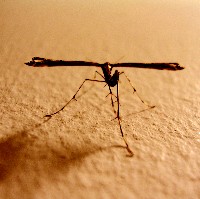 Researchers at the Norwegian University of Life Sciences, near Oslo, are studying and testing plant extracts that have been used in traditional African medicine to fight malaria. The team hopes the project leads to supplements and replacements for today’s conventional medicines.
Researchers at the Norwegian University of Life Sciences, near Oslo, are studying and testing plant extracts that have been used in traditional African medicine to fight malaria. The team hopes the project leads to supplements and replacements for today’s conventional medicines.
Malaria is a mosquito-borne disease caused by a parasite. People with malaria often experience fever, chills, and flu-like illness, which if left untreated can lead to severe complications and death. In 2008, an estimated 190 to 311 million cases of malaria occurred worldwide, with 708,000 to 1,003,000 deaths, mostly young children in sub-Saharan Africa.
The malaria parasite has gradually developed resistance to choloroquine, the cheapest and the most used drug. To make matters worse, several mosquito species that host and transmit the parasite have also become resistant to insecticides, making it difficult to eliminate them from populated areas.
The Norwegian researchers have begun by testing the effectiveness of some traditional plant extracts — sweet wormwood plant and the bark of the cinchona tree — against the parasite and mosquitoes, and check for potential toxins to make sure the plants are safe. Researcher Torunn Stangeland notes that several plants that have been shown to kill the malaria parasite, while others are toxic to malaria-transmitting mosquitoes and could used as insecticides.
The researchers will also investigate if there are synergistic effects of different compounds in the plant extracts. The malaria parasite and mosquitoes may have more trouble developing resistance to the medicines or insecticides if the entire plant is used, because of the many different chemical components that are present in varying concentrations.
“We hope the pilot project will lead to a larger, more comprehensive study,” says Strangeland, “with clinical tests of the plant-based medicines and insecticides as a main element.”
Read more:
- Collaboration Researching Vaccine Against Malaria Parasite
- Gates Foundation Grants $50M for New Insecticides
Photo: Germán Meyer/Flickr

 RSS - Posts
RSS - Posts
You must be logged in to post a comment.